There are so many options available to customers, it’s becoming increasingly difficult to capture their attention and convince them to choose your product or service over the competition. This is where deep personalization enters the scene!
Deep personalization is a powerful marketing strategy that allows businesses to create tailored messages and experiences for individual customers. By analyzing customer data and using the insights gained to provide personalized recommendations, you can increase engagement and conversion rates while also building customer loyalty and satisfaction.
- What Is Deep Personalization?
- Why Marketers Need Deep Personalization?
- Where Does Deep Personalization Work Best?
- Benefits of Deep Personalization
- Top 8 Deep Personalization Strategies
- 1. Account-Based Marketing
- 2. Dynamic Content
- 3. Personalized Emails
- 4. Retargeting Ads
- 5. Chatbots
- 6. Personalized Landing Pages
- 7. Social Media Targeting
- 8. Predictive Analytics
- The Future is Personalized Marketing
We will explore the concept of deep personalization and its benefits for B2B marketing. We will also examine where deep personalization works best, and the top eight strategies and tools businesses can use to implement deep personalization in their marketing campaigns.
So, let’s dive deeper into deep personalization and explore how it can transform your B2B marketing efforts.
What Is Deep Personalization?
Deep personalization is a marketing strategy that goes beyond basic personalization. Basic personalization includes using a customer’s name or location in marketing messages, but deep personalization takes it a step further. It uses customer data such as behavior, interests, and preferences to create highly targeted and relevant marketing campaigns.
Why Marketers Need Deep Personalization?
The answer is simple. Customers expect personalized experiences from brands. In fact, according to a study by Epsilon, 80% of customers are more likely to do business with a company if it offers personalized experiences. Deep personalization allows marketers to deliver on this expectation, providing customers with relevant and meaningful experiences that resonate with them.
What’s more, deep personalization is crucial in B2B marketing as it allows you to create targeted campaigns and content that address your customers’ specific business challenges. It shows your customers that you understand their needs, interests, and pain points. Plus, it showcases your expertise and solutions to help your target customers achieve their business goals.
Deep personalization also helps you stand out in a crowded market. With so many companies vying for your customers’ attention, it’s essential to create personalized experiences they can identify with. Personalized experiences create a positive and memorable impression, leading to increased loyalty, repeat business, and positive word-of-mouth.
Where Does Deep Personalization Work Best?
Deep personalization works best in B2B marketing, where the sales cycle is longer, and relationships are crucial for business growth. Unlike B2C marketing, which often involves short, transactional interactions, B2B marketing focuses on building long-term customer relationships. This means B2B customers expect personalized experiences and tailored solutions to their email marketing challenges.
Related article: B2B Sales Strategies to Grow Your Business
B2B marketing also typically involves multiple touchpoints and interactions between the buyer and seller. Deep personalization allows you to understand each customer’s unique situation and provide more relevant, tailored, and valuable solutions at every stage of the sales cycle.
For example, as a B2B marketer, you might want to use deep personalization to create customized email campaigns that speak directly to the challenges and pain points of a particular prospect.
Or you may want to use customer data to personalize the content on your website or create tailored landing pages for specific target accounts. That’s not all, you can use account-based marketing strategies to create personalized campaigns that target specific decision-makers within a target account.
Overall, deep personalization is essential for B2B marketers who want to build strong relationships with their customers and win more business. But that doesn’t mean you cannot use deep personalization in B2C marketing.
In fact, B2C deep personalization goes beyond traditional segmentation and targeting techniques that group customers into broad categories and instead focuses on creating highly personalized and relevant experiences for each individual customer.
B2B marketers can achieve deep personalization through various methods, such as collecting and analyzing customer data, leveraging artificial intelligence and machine learning, and using the best email marketing automation tools.
One of the key benefits of deep personalization in B2C marketing is the ability to increase customer engagement and loyalty. By delivering highly personalized experiences, businesses can create stronger emotional connections with their customers and make them feel valued and understood. This can lead to increased customer satisfaction, repeat purchases, and positive word-of-mouth referrals.
Additionally, deep personalization can help businesses optimize their marketing efforts by delivering the right message to the right customer at the right time, resulting in higher conversion rates and better ROI. Deep personalization in B2C marketing can help businesses stand out from the competition and build long-lasting relationships with their customers.
Benefits of Deep Personalization
So, what are the benefits of deep personalization, and why is it crucial for your business? Let’s have a look!
- Increased engagement: Personalized content and messaging are more likely to capture your customers’ attention, resulting in higher engagement rates. When your customers feel like you’re speaking directly to them and addressing their specific needs, they’re more likely to take action
- Improved conversion rates: Deep personalization allows you to create highly targeted campaigns that address your customers’ unique needs and problems, resulting in higher conversion rates.
By providing relevant and meaningful experiences, you increase the likelihood of your customers making a purchase. Customers prefer buying from brands that understand how customers use their products or services.
- Increased customer loyalty: When your customers receive personalized experiences, they feel valued and appreciated. This can help build increased loyalty, leading to repeat business. Remember, building strong relationships with your customers can help establish a foundation of trust and mutual benefit.
- Enhanced customer experience: Personalization creates a positive and memorable experience for your customers, which can lead to positive word-of-mouth and referrals. By providing exceptional customer experiences, you set yourself apart from the competition and create long-term relationships with your customers.
- Competitive Advantage: In today’s crowded marketplace, businesses that prioritize deep personalization have a distinct competitive advantage. By creating a unique and personalized experience for their customers, you can differentiate yourself from your competitors and stand out in a sea of similar businesses. This can help you attract new customers and retain existing ones.
- Greater Efficiency: Personalized marketing campaigns are more efficient than generic ones because they target specific customer groups. By focusing on the customers who are most likely to respond to a particular message, businesses can reduce the amount of time and resources they spend on marketing. This allows them to achieve greater results with less effort.
Read also: Why Outreach Marketing is Important for Your Business?
Top 8 Deep Personalization Strategies
Now that you understand the benefits and importance of deep personalization, let’s have a look at some practical examples of deep personalization strategies. We’ll also provide examples and introduce deep personalization tools along the way. Keep reading!
1. Account-Based Marketing
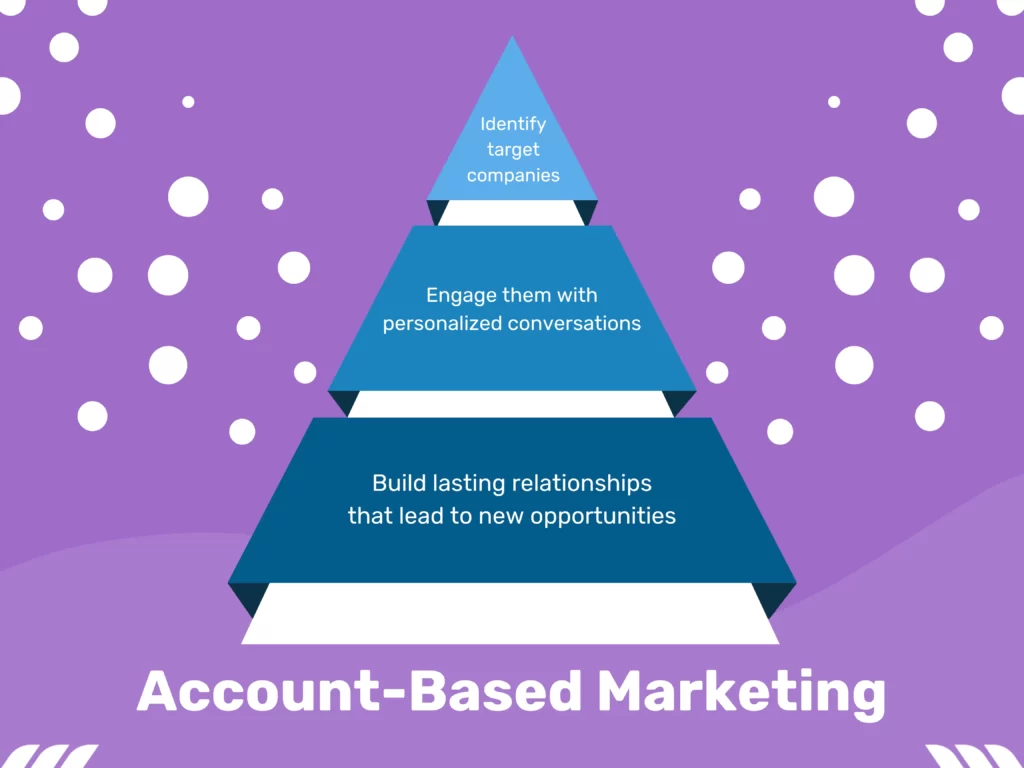
Account-Based Marketing (ABM) is a B2B marketing strategy that focuses on targeting high-value accounts with personalized campaigns. It involves using data and insights to create tailored messages and experiences for each account, leading to increased engagement and conversion rates.
ABM tools like Terminus and Demandbase allow you to identify high-value accounts and create personalized campaigns that target specific decision-makers within those accounts.
For example, you can create personalized landing pages and content that address the specific pain points and challenges of a particular account, increasing the likelihood of conversion.
2. Dynamic Content
Dynamic content lets you personalize website content based on customer data and behavior. By using data such as location, industry, or past interactions with your website, you can create personalized content that speaks directly to the individual needs and interests of each customer.
Tools like Optimizely and Evergage enable you to create dynamic content that changes based on a customer’s behavior or preferences.
For example, if a customer has previously shown interest in a particular product, you can show them related products or content that may interest them.
3. Personalized Emails
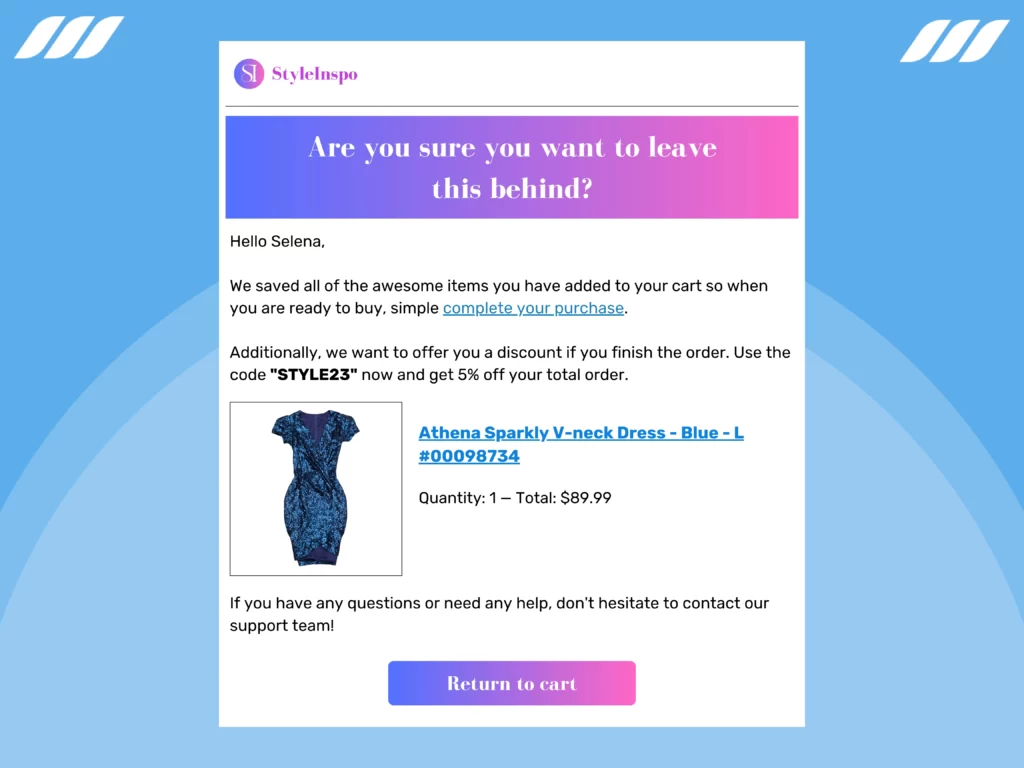
The email personalization strategy is to use customer data, such as behavior, preferences, and past purchases to create relevant and personalized messages. It is a good idea to segment your customers and then use dynamic content to create emails that are tailored to their specific needs and interests.
Tools like HubSpot and Marketo allow you to create automated email campaigns that use customer data to create personalized messages.
For example, you may want to create an email campaign that targets customers who have abandoned their shopping cart. You can offer them personalized recommendations or discounts, encouraging them to complete their purchase.
In fact, a new study found that 91% of customers are more likely to do business with companies that provide personalized and relevant recommendations.
4. Retargeting Ads
Retargeting ads help you target customers who have interacted with your website or content but have not yet converted. It uses data, such as website behavior and search history, to create personalized ads that draw customers to your website so they can complete their purchase.
Tools like AdRoll and Google AdWords allow you to create retargeting campaigns that target customers with personalized ads based on their behavior and interests.
For example, if a customer has abandoned their shopping cart, you can show them personalized ads to encourage them to complete their purchase.
5. Chatbots
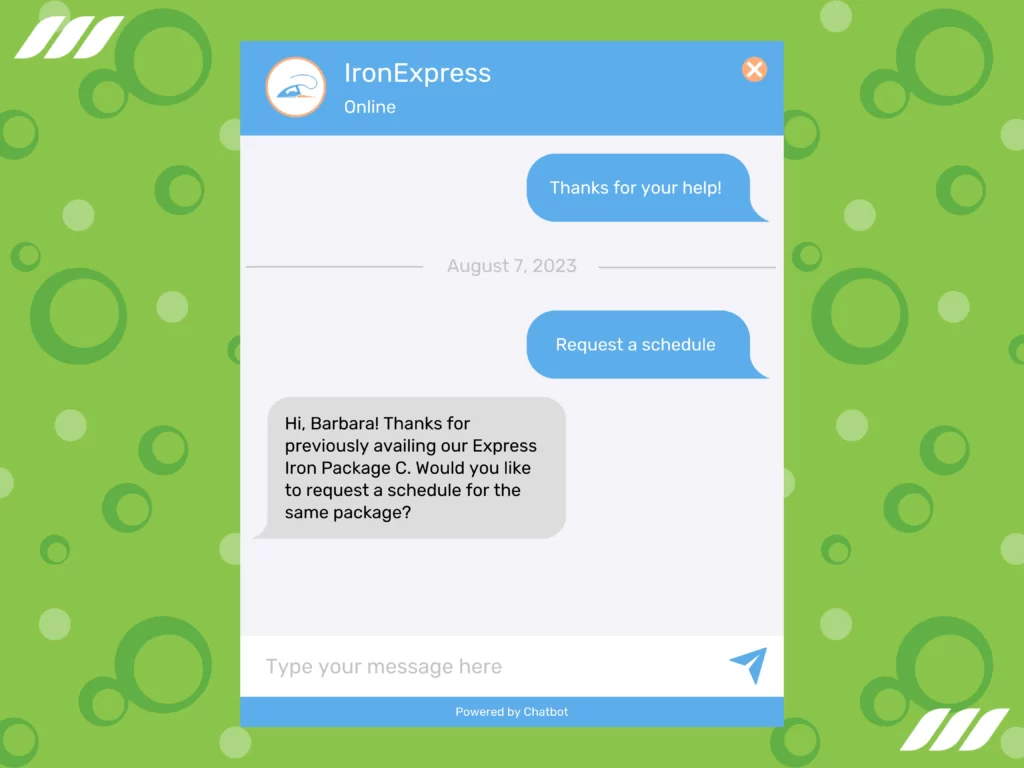
Chatbots use artificial intelligence and natural language processing to provide personalized support to customers. The bots tap into customer data and behavior to generate personalized responses. This helps improve customer experience and increase customer satisfaction.
Tools like Drift and Intercom allow you to create chatbots that use customer data and behavior to provide personalized support.
For example, if a customer has previously interacted with your chatbot, you can create a personalized experience that remembers their preferences and provides relevant recommendations or support.
6. Personalized Landing Pages
This deep personalization strategy also relies on customer data and behavior to create deliver experiences. Personalized landing pages are adapted to their specific needs, problems, and interests of your target customers. Plus, it displays customized content for each user, increasing the likelihood of conversion and customer loyalty.
Tools like Unbounce and Instapage allow you to create personalized landing pages based on customer data.
For example, if a customer has previously shown interest in a particular product, you can create a landing page highlighting that product and offering more recommendations or discounts.
7. Social Media Targeting
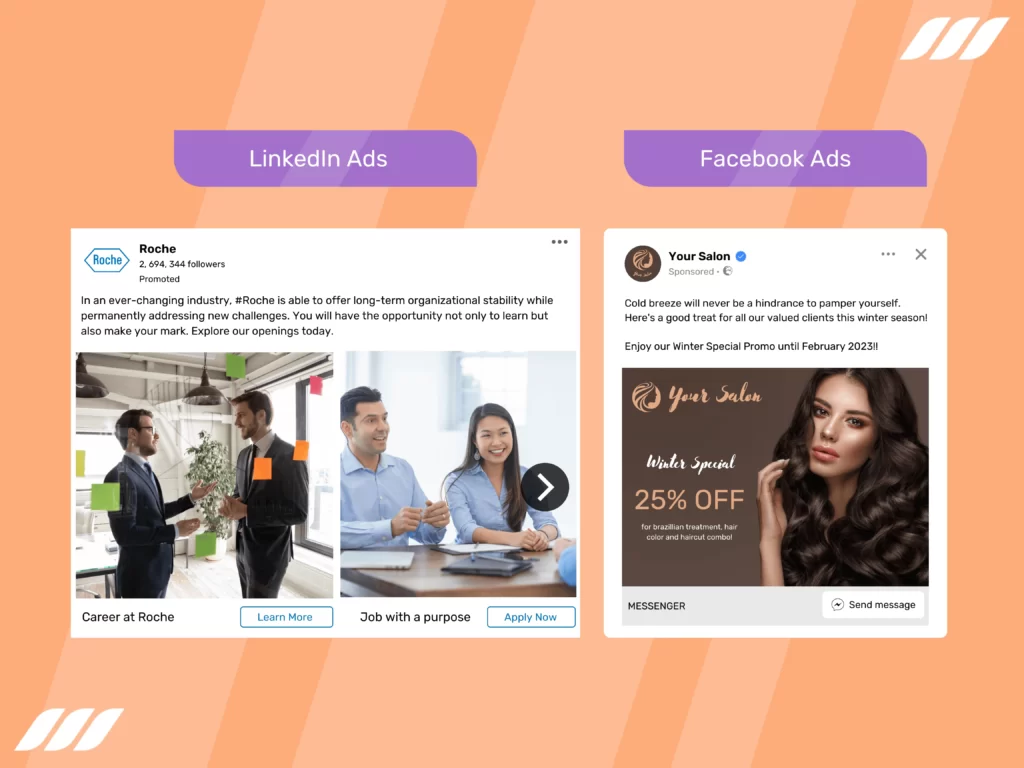
Social media targeting allows you to create highly targeted campaigns based on customer demographics, interests, behavior, and other metrics. By targeting the right audience with the right messages, you increase the likelihood of engagement and conversion.
Tools like LinkedIn Ads and Facebook Ads allow you to create highly targeted campaigns that use customer data to create personalized messages.
For example, if you are targeting a specific industry, you can create a campaign that highlights the specific pain points and challenges of that industry
8. Predictive Analytics
Predictive analytics uses machine learning algorithms to predict future behavior and interests of your target audience. It then creates personalized messages and experiences, leading to better engagement and conversion rates.
Tools like IBM Watson let you use predictive analytics to create personalized campaigns that target customers based on their predicted behavior and interests.
For example, if a customer has previously purchased a particular product, predictive analytics can identify other products that they may be interested in. As such, you easily create personalized recommendations and campaigns that target those products.
Overall, deep personalization is a powerful strategy that can help B2B marketers increase engagement and conversion rates. We recommend combining these strategies and tools to create tailored campaigns that speak directly to the needs and interests of each customer.
Read also: How Fast Do Marketing Leads Turn Cold
The Future is Personalized Marketing
The future of marketing is all about personalization. It’s no longer enough to create a one-size-fits-all marketing strategy and expect it to be effective. The modern customers are more discerning than ever before; they want to be treated as individuals, not just another number.
The good news is that with the rise of big data and machine learning, businesses have the ability to collect vast amounts of data about their customers and use it to create highly personalized marketing campaigns.
As a business owner or marketer, you can now capitalize on personalized marketing to better understand your customers. By analyzing customer data, you’ll gain insights into your customers’ preferences, behaviors, and interests. You can then use this information to create targeted marketing campaigns more likely to resonate with your customers.
For example, a clothing retailer might use data about a customer’s past purchases to recommend items that are similar to what they have bought before. Or the best CRM software service can use personalized marketing strategies to establish long-term, trusted relationships with its customers.
When customers feel that a business understands their needs and preferences, they are more likely to feel loyal to that business. By creating personalized marketing campaigns that speak directly to individual customers, businesses can foster a sense of connection and engagement that is hard to achieve through more generic marketing tactics.
Of course, there are also challenges to implementing personalized marketing strategies.
One of the biggest challenges is balancing the desire for personalization with concerns about privacy and data security. Consumers are increasingly aware of the data that businesses collect about them, and they want to know that their information is being used responsibly and ethically.
Businesses that demonstrate their commitment to data security and privacy are more likely to win the trust and loyalty of their customers. Overall, the future of marketing is all about personalization.
Businesses can build stronger relationships and drive more sales and revenue by using data and technology to create highly targeted and personalized marketing campaigns. While there are certainly challenges to overcome, the benefits of personalized marketing are clear. Businesses that embrace this trend will likely thrive in the future.
Conclusion
As technology continues to evolve and customer expectations shift, personalized marketing will become even more critical for B2B companies. Customers expect relevant and personalized experiences across all touchpoints, and companies that fail to deliver will be left behind.
Deep personalization is not just a trend, but a fundamental shift in how companies approach marketing. By focusing on the individual needs and interests of customers, companies can create long-term relationships and sustainable business growth.
It’s no secret that deep personalization is a powerful tool for B2B companies looking to create relevant and personalized experiences for their customers. Companies can increase engagement, conversion rates, and customer loyalty by using customer data and behavior to create highly targeted campaigns and content.
Whether you’re using account-based marketing, dynamic content, personalized emails, or social media targeting, the key is to focus on the individual needs and interests of your customers. By doing so, you can create long-term relationships built on trust, mutual benefit, and exceptional customer experiences.
So, start implementing deep personalization in your B2B marketing efforts today and watch your business grow!
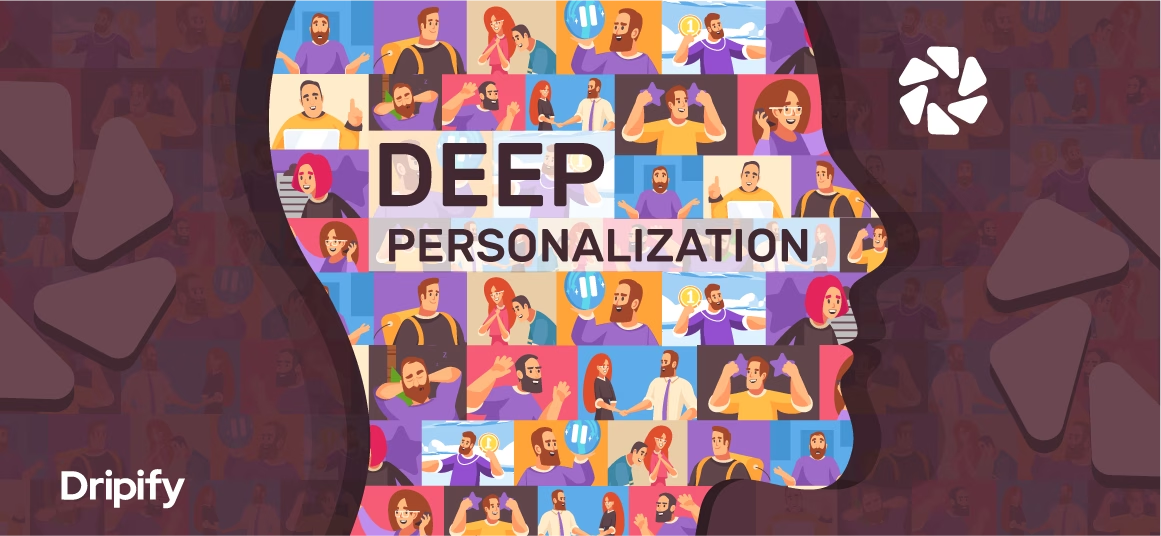
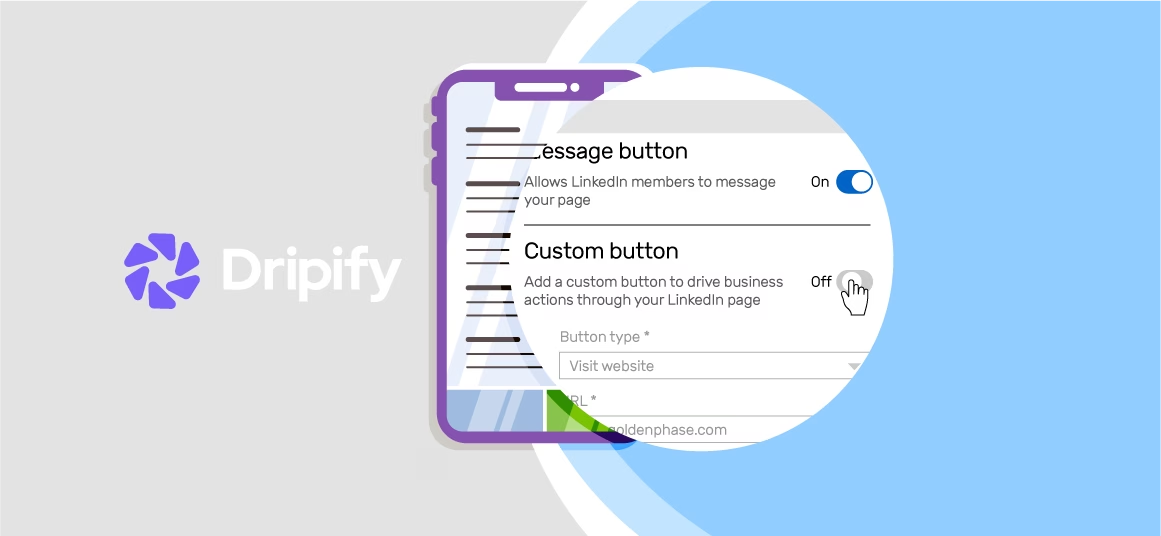
![Email Outreach Tracking [Tips, Tricks and Tools]](https://dripify.io/wp-content/uploads/2025/02/11-7-png.avif)
![Create a Prospecting Plan [+8 Prospecting Methods]](https://dripify.io/wp-content/uploads/2025/02/11-png.avif)